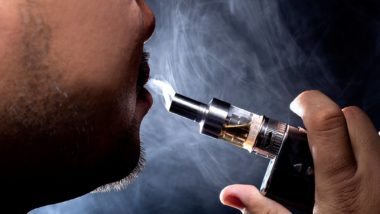Harvard researchers have found that “pod-based e-cigarettes have a higher potential to get youth and young adults addicted than other devices,”
Researchers at Harvard’s T.H. Chan School of Public Health recently completed a systematic review of data on the design and biological effects of e-cigarettes that use vape pods. The findings uncovered evidence that vape pods, versus other types of e-cigarettes, may trigger a more powerful addiction in those who use them.
On the Harvard Gazette website, university communications official Amy Roeder wrote that the data indicate “JUUL and similar pod-based e-cigarettes’ efficient delivery of nicotine may foster greater dependence than other types of e-cigarettes.”
How Vape Pods Work
Vape pods were introduced to the market in 2015 and feature flavored capsules that are inserted into a handheld inhalation device for smoking. The unit is similar in size and shape to a USB drive.
Like other e-cigarettes, the ones with vape pods convert liquid nicotine into a vapor the smoker inhales. Unlike other e-cigarettes, the pods use a different compound of nicotine combined with various fruity, sweet, and herbal formulas to enhance the taste and aroma, contributing to their appeal, particularly among teens and young adults.
According to Harvard’s research, the specific mechanism employed by the vape pods “ensures the delivery of high doses of nicotine in a low pH form, which is less harsh compared to the higher pH nicotine found in most other e-cigarette brands, thus encouraging deeper inhalation.”
In a study reviewed by the Harvard team, the level of nicotine exposure in adolescents using JUUL or other brands of vape pod e-cigarettes was higher than levels in those who smoked regular cigarettes.
A JUUL pod contains the nicotine equivalent of a pack of tobacco cigarettes.
 What the Harvard Review Involved
What the Harvard Review Involved
The full research report compiled by the team at Harvard’s Chan School was also published by the Journal of the American Medical Association and posted on its pediatrics division website on June 1. In the overview, it says that while e-cigarette use has ballooned in recent years, “knowledge gaps exist on the potential health effects of using recently introduced pod-based e-cigarettes.”
The study’s stated objective was to conduct a systematic review of peer-reviewed scientific literature on the subject. Its findings were based on 35 reports and articles published between June 2015 and June 2019, culled from online databases that presented primary data on pod-based e-cigarettes — their design, biological effects, marketing, and social media messaging, use and perception.
Research Findings
After poring over nearly three dozen studies and scientific papers on vape pod e-cigarettes, the Harvard researchers determined that the unique design of the device and the vape pods themselves “may contain less harmful constituents that other types of e-cigarettes.” but there is no evidence they are safe, especially for young people. There is evidence, however, of higher nicotine dependence associated with their use, the review states.
“We found that pod-based e-cigarettes have a higher potential to get youth and young adults addicted than other devices,” review co-author Stella Lee told the Gazette. Lee is a former postdoctoral fellow at the National Cancer Institute and a current assistant professor at Konkuk University in South Korea. “To prevent this from happening, we need stronger health communication messages that alert people to these findings,” she went on to say.
Adolescent vaping has increased so much in recent years that U.S. Surgeon General Jerome Adams declared youth vaping an epidemic in late 2018. The skyrocketing sales of JUUL vape pod e-cigarettes – which saw a 600-percent surge in 2016-2017 – was cited specifically in Adams’ declaration.
Marketing Matters
In addition to the biological effects of vape pod e-cigarettes, the Harvard team examined manufacturers’ marketing and social media campaigns. They found vape pod makers target youth and young adults with messages focused on flavors and lifestyle appeal.
Join a Free E-Cigarette Heart & Lung Lawsuit Investigation
If you or a loved one developed heart or lung problems after using e-cigarettes containing nicotine and/or THC, you may qualify to join this e-cigarette lung injury lawsuit investigation.Learn more by filling out the form on this page for a free case evaluation by a JUUL e-cigarette injury lawyer.
ATTORNEY ADVERTISING
Top Class Actions is a Proud Member of the American Bar Association
LEGAL INFORMATION IS NOT LEGAL ADVICE
Top Class Actions Legal Statement
©2008 – 2024 Top Class Actions® LLC
Various Trademarks held by their respective owners
This website is not intended for viewing or usage by European Union citizens.
Get Help – It’s Free
Join a Free E-Cigarette Heart & Lung Injury Lawsuit Investigation
If you qualify, an attorney will contact you to discuss the details of your potential case at no charge to you.
PLEASE NOTE: If you want to participate in this investigation, it is imperative that you reply to the law firm if they call or email you. Failing to do so may result in you not getting signed up as a client or getting you dropped as a client.
E-mail any problems with this form to:
Questions@TopClassActions.com.


 What the Harvard Review Involved
What the Harvard Review Involved










